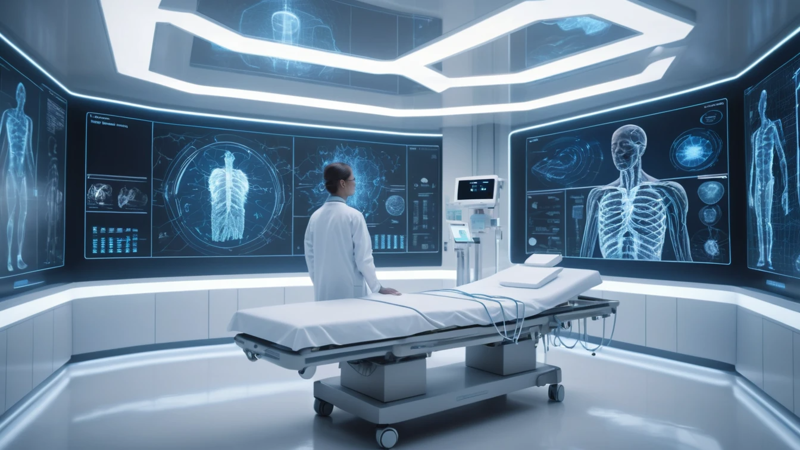Machine Learning in healthcare is transforming diagnosis, treatment, and patient outcomes. Discover how AI solutions are reshaping the medical world.
Machine learning is transforming healthcare by improving diagnosis accuracy, personalizing treatment, predicting diseases, and automating clinical workflows. It enables faster decisions, reduces errors, and supports doctors with data-driven insights. This revolution is driving better patient outcomes and more efficient care delivery.
How Machine Learning Is Revolutionizing Healthcare
Have you ever wondered how hospitals are becoming smarter, faster, and more accurate in patient care? 🤔 The answer lies in machine learning — a powerful technology that allows computers to learn from medical data and improve decisions without needing to be explicitly programmed. And right now, it’s reshaping healthcare in ways we’ve never seen before.
Machine learning is not just a tech trend. It’s actively helping doctors diagnose diseases earlier, personalize treatments, reduce medical errors, and even predict patient outcomes before symptoms fully appear. Let’s dive into how this transformation is happening — and what it means for the future of medicine.
Understanding The Basics Of Machine Learning 🧠
Machine learning (ML) is a subset of artificial intelligence that trains systems to recognize patterns in large datasets. In healthcare, ML models analyze:
- Patient medical records
- Lab results
- Medical imaging
- Genetic information
- Wearable health tracker data
The more data these models analyze, the smarter they become.
Why This Matters In Medicine
Healthcare generates enormous volumes of data — more than any single doctor can process.
Machine learning acts like a digital assistant, spotting patterns faster and more accurately.
Why Healthcare Needs Machine Learning Now More Than Ever
Modern healthcare faces challenges:
- Increasing patient load
- Physician burnout
- Rising treatment costs
- Complex disease conditions
Machine learning helps reduce pressure by:
- Automating routine tasks
- Supporting decision-making
- Enhancing diagnostic accuracy
- Optimizing resource use
In short, ML allows doctors to do more with less.
Improving Diagnostic Accuracy 🔍
One of the biggest breakthroughs is in medical imaging. Machine learning algorithms can read:
- X-rays
- CT scans
- MRI scans
- Mammograms
Even tiny signs of disease that humans might overlook can be detected.
Real-World Example
Google DeepMind developed an AI model that detects breast cancer more accurately than radiologists in clinical testing.
This doesn’t replace doctors — it supports them, ensuring faster, more confident decisions.
Personalized Medicine And Treatment Plans 💊
Every patient is unique. Machine learning helps doctors tailor treatments based on:
- Genetic makeup
- Lifestyle
- Disease history
- Real-time health data
This is called precision medicine.
Example in Practice
In cancer treatments, ML predicts how a patient will respond to certain drugs, avoiding trial-and-error approaches.
This leads to:
✅ Better outcomes
✅ Fewer side effects
✅ Faster recovery time
Predictive Analytics In Patient Care 📊
Machine learning can predict disease risks before symptoms appear.
What ML Can Predict
- Risk of heart attack
- Likelihood of diabetes
- Hospital readmission chances
- Sepsis development
Hospitals use predictive systems to proactively treat high-risk patients, saving lives and reducing costs.
Wearable Technology And Remote Monitoring ⌚
Wearable health devices like Fitbit, Apple Watch, and glucose monitors continuously track data such as:
- Heart rate
- Blood oxygen
- Sugar levels
- Sleep patterns
How ML Helps
Machine learning analyzes this data to:
- Detect irregularities
- Trigger alerts
- Suggest lifestyle improvements
This enables continuous care outside the hospital.
Enhancing Medical Imaging With Machine Learning
Machine learning models can clean, enhance, and segment medical images, making disease features clearer.
Benefits
- Reduced diagnostic time
- Early detection of tumors
- Less radiation exposure for patients
- Higher accuracy in surgery planning
Comparison of Traditional Diagnosis vs ML-Assisted Diagnosis
| Feature | Traditional Diagnosis | ML-Assisted Diagnosis |
| Time Required | Longer | Faster |
| Accuracy | Depends on doctor experience | Consistently high |
| Data Handling | Limited capacity | Handles massive datasets |
| Precision | Variable | Highly precise and consistent |
Machine Learning In Drug Discovery And Development 💼
Developing new medicines is expensive and time-consuming. Machine learning speeds up:
- Molecule screening
- Target identification
- Clinical trial predictions
Example
IBM Watson Health uses ML to analyze biological data and accelerate drug development.
This could reduce new drug development timelines from 12 years to just a few years.
Robotics-Assisted Surgery 🤖
Machine learning helps robotic surgery systems like Da Vinci Surgical System improve precision.
Advantages
- Smaller incisions
- Less pain
- Faster recovery
- Lower infection risk
ML monitors surgeon performance and suggests real-time adjustments.
Telemedicine Powered By ML 📞
Telemedicine became popular during the pandemic. Machine learning helps by:
- Scheduling smarter
- Analyzing symptoms via chat
- Translating speech to medical terminology
- Providing virtual assistants
Patients receive faster support without waiting rooms.
Reducing Hospital Administrative Burden 🏥
Admin tasks consume up to 50% of doctor time.
Machine learning automates:
- Billing codes
- Appointment scheduling
- Insurance claims
- Documentation workflows
This allows doctors to spend more time with patients.
Ethical Considerations And Data Privacy 🔐
With more data comes more responsibility.
Key Concerns
- Patient privacy
- Algorithm fairness
- Transparent decision-making
Healthcare organizations must follow HIPAA and GDPR guidelines to ensure trust and safety.
Key Healthcare Areas Using Machine Learning
| Healthcare Segment | ML Applications | Impact |
| Diagnostics | Imaging, pathology | Faster, more accurate results |
| Treatment Planning | Personalized medicine | Better patient outcomes |
| Hospital Operations | Scheduling, staffing | Reduced workload & costs |
| Patient Monitoring | Wearables, alerts | Early detection & prevention |
Challenges Slowing ML Adoption
Even with major benefits, challenges include:
- Limited quality training data
- High implementation costs
- Need for skilled technicians
- Regulatory compliance
However, these challenges are reducing as technology advances.
Future Of Machine Learning In Healthcare 🚀
The future looks promising. Expect:
- More AI-driven hospitals
- Smart ICU management systems
- Fully personalized treatment protocols
- AI alerts for early disease detection
Machine learning will not replace doctors — it will empower them.
Examples of Leading Machine Learning Tools in Healthcare
| Tool Name | Primary Use | Organization |
| DeepMind AI | Disease detection | |
| Watson Health | Clinical data analysis | IBM |
| PathAI | Pathology diagnostics | PathAI Inc. |
| Zebra Medical Vision | Radiology insights | Zebra Medical |
| Butterfly iQ | Portable ultrasound ML support | Butterfly Network |
Conclusion
Machine learning is reshaping healthcare by making diagnosis faster, treatments more personalized, and patient care more efficient. It helps doctors make better decisions, reduces human error, and improves patient outcomes. As data grows and tools advance, machine learning will continue to unlock a new era of smart, proactive, and life-saving healthcare. The future of medicine is not just digital — it’s intelligent.
FAQs
- How does machine learning improve healthcare?
Machine learning analyzes large medical datasets to support diagnosis, predict disease risks, and personalize treatments. It improves accuracy and saves time. Doctors use ML insights to make better clinical decisions. - Is machine learning safe to use in hospitals?
Yes, when developed and monitored correctly. Hospitals follow strict privacy and safety rules to ensure ML systems are reliable. It assists doctors rather than replacing them. - What is an example of machine learning in everyday healthcare?
Wearables like smartwatches use ML to track heart rhythms and detect irregularities. They can alert users to potential health issues early. This empowers preventive care. - Can machine learning replace doctors in the future?
No, ML enhances rather than replaces medical professionals. Human judgment, empathy, and expertise remain essential in healthcare. ML simply provides data-driven support. - What skills are needed to use machine learning in healthcare?
Professionals need medical knowledge combined with data science understanding. Training programs now help healthcare workers adopt ML tools effectively.



Leave a Reply